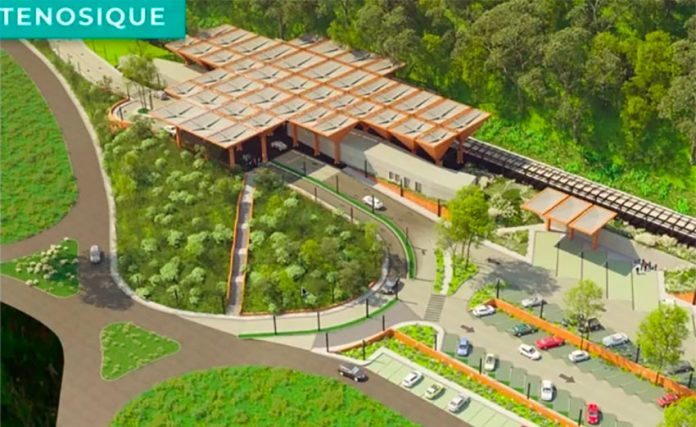Approximately 160 indigenous collectives and civil society organizations as well as almost 100 individuals have once again denounced the construction of the Maya Train railroad, a federal government infrastructure project that will link cities and towns in southeastern Mexico.
In a lengthy document whose publication coincides with President López Obrador’s tour of the Yucatán Peninsula to inaugurate construction of different sections of the US $8-billion railroad, the groups said the rights of the residents of the five states through which the train will run have been trampled on and charged that the project will cause irreversible damage to the environment.
They also criticized López Obrador for traveling to the Yucatán Peninsula at the most critical stage of the coronavirus pandemic.
The document said that a study completed by more than 30 scientists commissioned by the National Council of Science and Technology and several others have determined that the construction and operation of the Maya Train will cause widespread environmental damage in the region.
Even natural protected areas will suffer from land degradation and deforestation, said the groups, among which are Greenpeace México and the Mexican Center for Environmental Law.
While charging that environmental harm is inevitable, the groups said that it is unclear what the full scale of the damage will be.
“There is no environmental impact evaluation of the project in its entirety,” the document said.
The project opponents said that the construction of new tracks and the operation of both tourist and freight trains on them will not be the only sources of environmental damage, charging that the development of new population centers and other complementary projects such as train stations will also take a toll.
The absence of a comprehensive environmental impact study represents a violation of both Mexican and international law, the groups said. Therefore, the National Tourism Promotion Fund (Fonatur), which is managing the project, has an obligation to submit the entire Maya Train project to environmental evaluation, they said.
The project opponents claimed that Fonatur is using its claim that much of the project will make use of existing tracks to justify its refusal to subject the project to a thorough environmental analysis.
“However, this is only partially true because the [existing] tracks will be widened along their entire length,” they said.

The groups also said the Maya Train poses a risk to the cultural identity of the indigenous people who live in the communities through which the tracks will run. Indigenous culture, namely that of the Mayan people who live in the region, could be marketed as a mere commodity, they argued.
Construction also poses a risk to thousands of archaeological sites in the near vicinity of the proposed route, they said.
The groups also charged that landowners are not being adequately compensated for land that will be incorporated into the project.
“The railroad infrastructure and the so-called development centers will inevitably mean … the privatization of community lands,“ the document said.
The opponents also said that the project will exacerbate overpopulation problems in the Quintana Roo “tourism corridor” between Cancún and Tulum.
They also renewed their criticism of last year’s Maya Train consultation process, which was described by critics as a sham and an empty gesture.
A vote on the project found 92% support but the United Nations said that the entire consultation process failed to meet all international human rights standards.
In their new broadside, the groups charged that the government had made a “unilateral” decision about “the future of the communities and indigenous peoples” through which the train will run under the pretext that they will be “the main beneficiaries.”
However, the “main role” of the local indigenous population will be to provide “cheap labor” for the railroad’s construction, they charged, warning that the project will perpetuate the “systematic discrimination” against indigenous people that the Mexican state has promoted for years.
“The thousands of jobs that will supposedly be created will most probably be precarious, poorly paid, temporary jobs without social security guarantees.”
López Obrador said Monday that construction of the train will help the economy recover from the coronavirus-induced crisis, asserting that it will create 80,000 jobs this year and 150,000 in 2021.
Fonatur chief Rogelio Jiménez Pons said that the construction and operation of the railroad will not have a negative impact on the environment and will help to lift more than one million people out of poverty.
Source: El Universal (sp)
